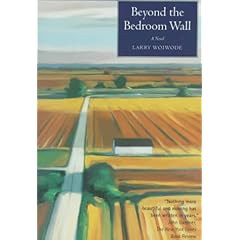Most midwestern writers satirize their home. Sinclair Lewis couldn't wait to get away: think of Main Street, my favorite book (and why am I not reading it now?): in which Carol, the librarian from the Twin Cities, marries and get stuck in a small town with no culture. Then of course there's Babbitt.

Perhaps Larry Woiwode's artistic, lyrical novels are closest to Morris's in style. His extraordinary classic, Beyond the Bedroom Wall, describes four generations of the Neumiller family in North Dakota. Woiwode wrote for The New Yorker for a while, then he disappeared and returned to North Dakota. He has a title there: laureate of North Dakota. Yet people seem to have forgotten his masterpieces, now that he is farming, now that he is writing less.
I prowled around the room and stared at my bookcase. After rejecting a few yuppiebacks from my collection, I dug out Miles Franklin’s saucy My Brilliant Career. Stella Maria Miles Franklin wrote this witty, autobiographical account of a pioneer girl’s rebellion in Australia at the turn of the century when she was 16. Her chatty, upbeat--resentful, but undefeatable--narrator, Sybilla, longs to escape the failing farm in the bush. She is passionate and ambitious: she wants desperately to read, write, sing, dance, anything artistic. But she is doomed to work dawn to dusk on her parents’ farm, until she is invited to her grandmother's. And that's not the end of course.
2 comments:
I very much enjoyed _My Brilliant Career_, book and film. However, I don't remember much from the book; I do remember the film. Made by a woman, Australian.
Ellen
The unpredictable heroine sometimes acts inexplicably and cruelly: after accepting a proposal, she whips her fiance and almost blinds him when he tries to kiss her. She really is a horrifying, neurotic woman, probably the result of primitive living in the bush and the hopelessness. But she is also brave, and Franklin writes well as the narrator in interior monologues and in dialogue argues for feminism.
Post a Comment